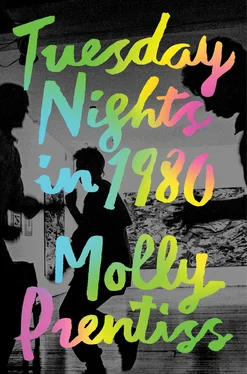Engales had learned of the NYU studios from a woman he’d slept with on his third day in New York, an art student with a thick pout and a set of inappropriate pigtails, whom he had met at the Laundromat That Never Sleeps. The concept of the Laundromat had eluded him, and he had fumbled with the quarters, the locks on the washers, the darks, the lights, the little packets of soap they sold in vending machines.
“Why are you so bad at laundry?” the girl had asked, while folding a shirt that looked to belong to a baby.
“Laundry is boring,” Engales had replied, knowing immediately upon looking her over — lanky limbs, a miniature skirt, the long dark pigtails framing her long young face — that they would sleep together.
“Everything’s boring,” she had said with a tone that showed she might mean it. When you were as young as she was — probably eighteen or nineteen, he guessed, when time seemed endless and unbreakable and empty — you still had the potential to be so bored. Though he was only twenty-three himself at that point, the girl made Engales feel old. He had perhaps become old, in spirit at least, much earlier: when your parents die, so does the idea of infinite time on the planet. Instead, you are forced into becoming weirdly wise, gaining too soon the knowledge that life is both precious and perfectly meaningless, neither philosophy leaving much room for boredom.
“Not everything,” he had said, pressing her up against a spinning dryer. They left their laundry in the moldy baskets meant for transporting it from washer to dryer and went upstairs to his hotel room. The walls were papered with roses and the air was musty, and from the next room, as they had the hasty sort of sex you have with people you don’t respect, they could hear the occasional scream.
“So what’s it like being a rich kid?” he had asked the girl after they had finished.
“What do you mean?” she had said.
“Well, you go to that fancy university, you wear these, what do you call them?” He flopped one of her pigtails with his fingers.
“Pigtails,” she said quietly.
“Pigtails!” He laughed. “Jesus.”
“I don’t even know why my parents pay for it,” she said then, with a sort of shy defiance, propping herself up on the bed and tugging the rubber bands out of her hair. “I mean they hardly teach you anything. If my parents weren’t such assholes I’d just teach myself the same stuff. Just walk into NYU and teach myself how to draw.”
Engales’s eyes were distant, looking at the roses on the wall, on whose two-dimensional petals two mosquitoes were courting each other spastically. He pushed the girl away — she was attempting to fondle his earlobe — and stood up. He suddenly very much disliked this person whom he was currently lying in bed with, but could she be on to something? He had no money at all to buy any paint or supplies. He had nothing, and nothing to lose. He looked at the girl’s breasts, which were large and falling down to one side, like a pair of mating walruses; he wanted to paint the walruses, give them mustaches. Could he just walk into a school full of rich kids and act like he went there? Set up shop? When the pigtailed girl went to the bathroom, he nabbed the key from her pant pocket whose brass face read STUDIO. He might as well try.
The next day he had shaved his scruffy face and stolen a backpack from a sporting goods shop on Broadway, then walked confidently past a very fat security guard who was busy studying his own stomach. After some wandering — through poorly lit corridors that smelled like aging books and empty rooms lined with green metal cabinets — he found the painting studio, unlocked and filled with sunlight. Only two harmless-looking students were working, and he staked out the prime real estate: a corner easel with the most light, which poured onto the easel from two large windows.
Engales was in awe of his discovery: this place was his idea of heaven. He had never had an easel before; he had never even painted on canvas. All of his painting back home had taken place inside of sticky notebooks or on butcher paper, tacked to the walls of his dead parents’ bedroom. This place had canvas you could just take, on a huge roll in the corner, and big rolls of good paper, too, and cans of turpentine, and scissors and paper cutters and wooden models of human bodies and hands whose digits moved into whatever position you wanted them to. He looked to one of the students, who was quietly painting in her own corner, for confirmation that this was indeed real, or to see if she might be as excited about all of this as he was, but she was busy getting very close to her canvas and fogging her glasses with her own breath, the same breath he would smell when he took her to bed later that week. As for the Pigtail girl, he saw her only once on campus after that; she glared at him in a way that suggested she hated him for never calling her back, then twitched her mouth in a way that suggested she’d never tell his imposter’s secret to a soul.
Now Engales used the Pigtail Key to let Rumi, curator extraordinaire and very rare beauty, into the studio, at close to eleven on New Year’s Eve. Of course, Engales was planning on a private experience — a little tour of his work, a little taking off of clothes. But to his surprise, the lights were on and he could hear Arlene’s hippie music drifting from her back corner.
“ You’re here?” he yelled back to her.
“Where the fuck else would I be?” Arlene said in the way that Arlene said everything, with unapologetic crassness. He loved Arlene’s way of speaking, which he had come to know was a distinctly New York accent: complaining vowels, absent R’s, words emerging sideways from somewhere in her bottom jaw.
“At a party? Being a normal person? It’s New Year’s!”
“It’s a real shame that I’m not a normal person,” she said, tossing her fat brush into a tin canister. “A serious fucking shame.”
Engales had met Arlene on his second day in the studio, and they had become fast, if unexpected, friends. He had guessed that she was in her late forties, from the single gray streak in her red hair and the shallow lines forking out around her eyes, and he had worried that she was the boss of the studio, ready to kick him out of his newfound art mecca.
“The boss?” Arlene had yelled. “Oh fuck no! Excuse my French. Are you French? No you couldn’t be French, too rough around the edges. But no, I’m not the boss. Name’s Arlene. I’m a painter.”
She had said this with a proud extension of her arms and a glance down to her paint-covered dress, which was shaped like a tent and emblazoned with squiggly lines and abstract fish. The dress swung out into a circle when she wheeled around to examine the canvas that Engales had been working on.
“Well I can see that,” Engales had said. “But aren’t you a little… old? I mean, to be a student here?”
“Old? Go fuck yourself,” she had said, thrusting a shoulder toward him. Then, with a little lift of her nose: “I’m what they call a visiting artist. Which is really quite hilarious, since technically I’ve been visiting for thirteen years. They’d never kick me out. I’m like those ugly sculptures in parks that you know were important once but are now just eyesores. Anyway, they’ve learned to ignore me.”
Engales raised his eyebrows and gave her a nod of approval. “So you’re working the system,” he said.
“Well that makes two of us, doesn’t it?” she said. She gave him a maternal wink, which he didn’t know whether to return or ignore.
“They invited me back when I mattered,” she continued. “I was one of those blips on the radar, you know? Famous for ten seconds? Now they’re stuck with me. Their gain, if you ask me! Ha! Oh. And by the way? Just so you know: that painting you’re working on is a piece of shit.”
Читать дальше












